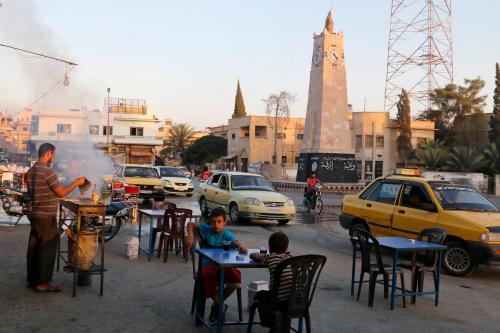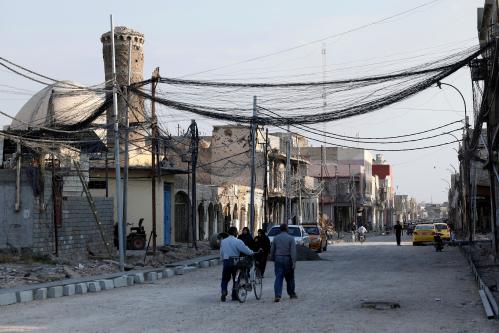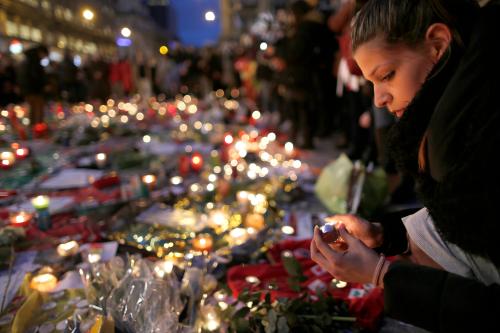Americans will gather around the dinner table this Thursday to give thanks for their blessings and pray for those less fortunate. Then the ritual feasting and arguing shall commence.
Most of the arguments this Thanksgiving will involve ISIS because 1) it’s been in the headlines nonstop, and 2) people don’t know much about the group so the subject is perfect for the exhausting debates that characterize the holiday. Here are some of the ISIS-related statements you can expect to hear, and what you need to know to outmaneuver your dad, impress your boyfriend, and maybe, just maybe, emanate a little more light than heat from your side of the debate.
“It’s about Islam.”
Yes: ISIS fights to reestablish the old Islamic empire or caliphate that ruled the Middle East and North Africa in the Middle Ages. Muhammad, the founder of Islam, used violence to establish a state based on religion. The guy who runs the Islamic State, Abu Bakr al-Baghdadi, has a Ph.D. in Quranic studies.
No: ISIS burned a Muslim pilot alive and filmed it. ISIS justified the cruel act by saying the man was an apostate who deserved to be burned because he was dropping bombs on Muslims. Islamic scripture expressly and repeatedly says that “apostates” should not be burned alive. ISIS ignores or argues away Islamic scriptures that place similar limits on its violence.
“These guys are mindless killers.”
Yes: Some of the people fighting under the Islamic State’s black banner are pure killers. They’re just looking for an opportunity to live out their dark fantasies. Mohammed Emwazi, the guy who beheaded the American hostages, probably fits the bill. He sometimes danced a tango with the prisoners he tortured.
No: ISIS’s leaders think deeply about strategy. You don’t establish a state and survive an onslaught by powerful enemies just by happenstance. The group’s favorite strategy manual, “The Management of Savagery,” explains how to establish a caliphate and ensure its survival.
“ISIS intends a Paris-style attack in the United States.”
Yes: Over the past few weeks, ISIS has demonstrated that it has the capability and intent to carry out mass-casualty attacks in the West. It’s also repeatedly stated that it wants to hit the United States.
No: Every U.S. counterterrorism official has said they know of no ISIS plots to carry out a Paris-style attack in the United States. Most say that the United States faces a much bigger threat from untrained lone wolf attackers than a coordinated assault.
“The president’s counter-ISIS strategy isn’t working.”
Yes: ISIS continues to maintain its government in Syria and Iraq. It has also expanded its reach far beyond its borders: It has affiliates throughout the Middle East and North Africa, some of which are quite powerful. It also has trained operatives in Europe who can do great harm.
No: Because of the campaign by the United States and its allies, ISIS has lost 25 percent of its territory, millions in revenue, and tens of thousands of soldiers over the past year. The United States could eradicate ISIS’s government with a large ground invasion, but it would have to go it alone—all of our allies in the region have higher priorities than the destruction of ISIS. Furthermore, the United States is pretty good at playing defense—there has not been another 9/11.
“ISIS sympathizers can infiltrate the United States with the Syrian refugees to carry out attacks here.”
Yes: Something similar happened before. Two men linked to al-Qaida in Iraq came to the United States as refugees from the Iraq war to procure weapons. And one of the Paris attackers might have slipped into Europe on a fake Syrian passport.
No: It’s not easy to come to the United States as a refugee—the background checks are so onerous that many Muslim translators who risked their lives to help the United States in Afghanistan and Iraq were turned away, much to the shame of the American soldiers who relied on them. Counterterrorism professionals are more worried about people with European passports because they can easily travel to the United States using the visa waiver program.
Readers will undoubtedly be frustrated that I haven’t resolved all the contradictions here. I try in my book, but unless you want to place it next to your turkey at the table, you’ll have to go it alone in your holiday disputes. Still, at least you can now argue all sides of the issue, frustrating everyone around you. If the argument ends with greater compassion for the victims of violence and a greater appreciation for all the tough decisions our leaders have to make, it will have been worth it.







Commentary
How to win your family’s ISIS debate this Thanksgiving
November 25, 2015